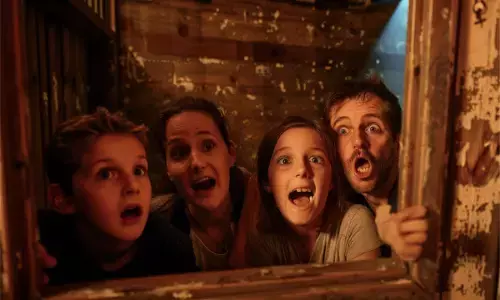Build a healthy relationship with your child

Build a healthy relationship with your child
A solid parent-kid relationship requires a ton of exertion and understanding. The relationship you create with your kids from earliest stages frames the premise of their social and close to home turn of events
A solid parent-kid relationship requires a ton of exertion and understanding. The relationship you create with your kids from earliest stages frames the premise of their social and close to home turn of events. However, it may not be simple all the time. With your rising age, mind-set swings, and various difficulties, you might find it hard to bond with them. In such circumstances, there are a few factors that should be considered. For instance, you really want to comprehend them and help each other arrangement with their concerns without being tyrannical. This post furnished you with the standards of the parent-kid relationship, including every one of the various ways and exercises to assist bond with them.
Grasping the parent-kid relationship
A parent-kid relationship (PCR) is one that supports the youngster's physical, personal, and social turn of events. It is an exceptional bond that each youngster and parent encounters, appreciates, and supports.
The relationship establishes the groundwork for the kid's character, decisions, and general way of behaving. Studies recommend that a solid parent-youngster relationship prompts positive kid and family results.
Cherishing guardians make adoring kids. Your relationship with your kids and that you are so appended to them demonstrates how the kid will be from here on out.
Here are a few positive outcomes from a solid parent-youngster relationship:
• Small kids who grow up with a solid and sound bond with their folks are bound to create cheerful and satisfying associations with others in their lives.
• A kid who has a solid relationship with his folks figures out how to control feelings under pressure and in tough spots.
• It inclines toward the psychological, semantic and profound improvement of the kid.
• Assists the kid with displaying hopeful and certain social ways of behaving.
• Sound parental association and contribution in the youngster's regular routine establishes the groundwork for better friendly and scholarly abilities.
• Secure connection prompts sound social, close to home, mental, and inspirational turn of events. Youngsters likewise gain solid critical thinking abilities when they have a positive relationship with their folks.
Parent-kid relationship at different stages
Nurturing is a regular occupation with advantages and difficulties that develop as the kid develops. Here, we investigate the parent-kid relationship at different stages:
Earliest stages — building warmth and security
In the initial a half year, babies for the most part cry, eat, rest, pee, and crap. What's more, accordingly, the guardians hold, feed, burp, change and wash the child. This way guardians stay close to the child while watching out for them.
At the point when the child is eager, he gets irritable. At the point when the parent takes care of him, the child's requirements are met, and he is blissful. The parent likewise feels glad for having the option to fulfill the child's necessities.
At the point when guardians carry out their essential role of supporting, cherishing, and really focusing on the kid, it makes a distinct and extraordinary parent-youngster relationship.
By their most memorable birthday, babies are probably going to foster a protected connection with the guardians or the essential parental figure.
Toddlerhood — venturing into the general public
At the point when the kid turns into a baby, the emphasis is on significantly shaping the youngster's way of behaving by instructing, directing, and supporting him. Guardians work with the socialisation cycle quietly during the initial two years and set up the kid to squeeze into a gathering or the general public at large.
Preschool — fostering a nurturing style
Different nurturing styles arise, with one style becoming conspicuous as the youngster accomplishes the preschool age. Notwithstanding, you can't utilise one specific style reliably across all circumstances; you really want to utilise a blend of procedures to bring up kids. Also, the parent-youngster relationship can be best depicted by the current nurturing style embraced by the guardians.
Young — being familiar with a world past home
At the point when the kid begins primary school, there is a change in his concentration from guardians to peers, however this doesn't change the elements of the parent-kid relationship. With the kid's rising mental and interactive abilities, he goes past the home setting.
This is the point at which the correspondence becomes two-way. The kid is in a situation to let the parent know what he needs and express his preferences. Your nurturing style will choose if the correspondence will be two-way or a one-way.
Nurturing styles continue as before as the kid develops and the style utilised in the preschool age keeps on influencing even in the center youth age.
Pre-adulthood — giving individual space to the youngster
High school is a fierce and weak stage, which achieves physical and mental changes in the youngster. Guardians ought to recognise and grasp their high schooler's necessities, support them, and give them the opportunity they need without being excessively controlling.
Nurturing with adoration and acknowledgment by embracing a positive methodology in any event, during testing times can be a successful method for directing young people.
Adulthood — chatting on equivalent terms
Adulthood is when strength begins setting in. The parent and the adult youngster are presently ready to connect with one another. Grown-up kids are in some cases conflicted between their own and matured guardians. Adjusting between the two can be very distressing. In any case, most grown-ups do keep a solid relationship with their folks.
The necessities and needs of one family are not the same as those of another. For example, the bond you share with your kid may not be equivalent to the one your companion imparts to their kid. This implies that your kind of parent-youngster bond is not the same as that of your companion.
Anyway, what is your sort of bond?









